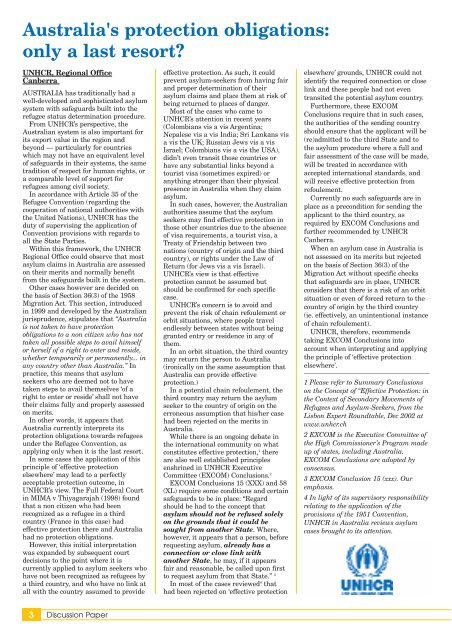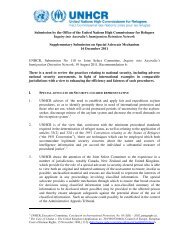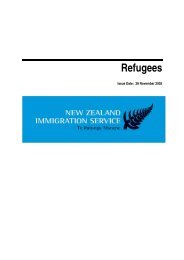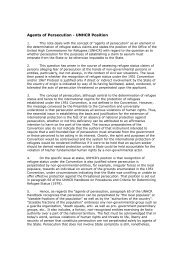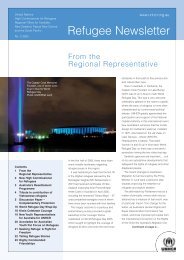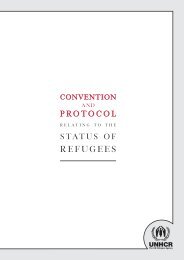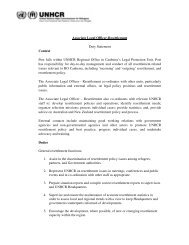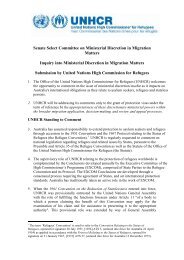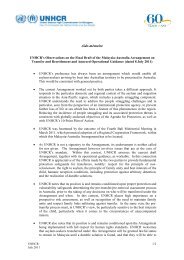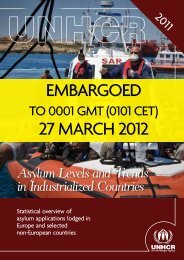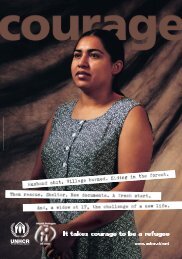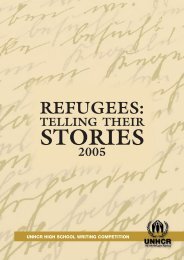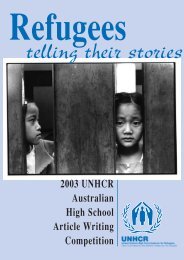download newsletter - unhcr
download newsletter - unhcr
download newsletter - unhcr
Create successful ePaper yourself
Turn your PDF publications into a flip-book with our unique Google optimized e-Paper software.
Australia's protection obligations:<br />
only a last resort?<br />
UNHCR, Regional Office<br />
Canberra<br />
AUSTRALIA has traditionally had a<br />
well-developed and sophisticated asylum<br />
system with safeguards built into the<br />
refugee status determination procedure.<br />
From UNHCR’s perspective, the<br />
Australian system is also important for<br />
its export value in the region and<br />
beyond — particularly for countries<br />
which may not have an equivalent level<br />
of safeguards in their systems, the same<br />
tradition of respect for human rights, or<br />
a comparable level of support for<br />
refugees among civil society.<br />
In accordance with Article 35 of the<br />
Refugee Convention (regarding the<br />
cooperation of national authorities with<br />
the United Nations), UNHCR has the<br />
duty of supervising the application of<br />
Convention provisions with regards to<br />
all the State Parties.<br />
Within this framework, the UNHCR<br />
Regional Office could observe that most<br />
asylum claims in Australia are assessed<br />
on their merits and normally benefit<br />
from the safeguards built in the system.<br />
Other cases however are decided on<br />
the basis of Section 36(3) of the 1958<br />
Migration Act. This section, introduced<br />
in 1999 and developed by the Australian<br />
jurisprudence, stipulates that “Australia<br />
is not taken to have protection<br />
obligations to a non citizen who has not<br />
taken all possible steps to avail himself<br />
or herself of a right to enter and reside,<br />
whether temporarily or permanently... in<br />
any country other than Australia.” In<br />
practice, this means that asylum<br />
seekers who are deemed not to have<br />
taken steps to avail themselves ‘of a<br />
right to enter or reside’ shall not have<br />
their claims fully and properly assessed<br />
on merits.<br />
In other words, it appears that<br />
Australia currently interprets its<br />
protection obligations towards refugees<br />
under the Refugee Convention, as<br />
applying only when it is the last resort.<br />
In some cases the application of this<br />
principle of ‘effective protection<br />
elsewhere’ may lead to a perfectly<br />
acceptable protection outcome, in<br />
UNHCR’s view. The Full Federal Court<br />
in MIMA v Thiyagarajah (1998) found<br />
that a non citizen who had been<br />
recognized as a refugee in a third<br />
country (France in this case) had<br />
effective protection there and Australia<br />
had no protection obligations.<br />
However, this initial interpretation<br />
was expanded by subsequent court<br />
decisions to the point where it is<br />
currently applied to asylum seekers who<br />
have not been recognized as refugees by<br />
a third country, and who have no link at<br />
all with the country assumed to provide<br />
effective protection. As such, it could<br />
prevent asylum-seekers from having fair<br />
and proper determination of their<br />
asylum claims and place them at risk of<br />
being returned to places of danger.<br />
Most of the cases who came to<br />
UNHCR’s attention in recent years<br />
(Colombians vis a vis Argentina;<br />
Nepalese vis a vis India; Sri Lankans vis<br />
a vis the UK; Russian Jews vis a vis<br />
Israel; Colombians vis a vis the USA),<br />
didn’t even transit those countries or<br />
have any substantial links beyond a<br />
tourist visa (sometimes expired) or<br />
anything stronger than their physical<br />
presence in Australia when they claim<br />
asylum.<br />
In such cases, however, the Australian<br />
authorities assume that the asylum<br />
seekers may find effective protection in<br />
those other countries due to the absence<br />
of visa requirements, a tourist visa, a<br />
Treaty of Friendship between two<br />
nations (country of origin and the third<br />
country), or rights under the Law of<br />
Return (for Jews vis a vis Israel).<br />
UNHCR’s view is that effective<br />
protection cannot be assumed but<br />
should be confirmed for each specific<br />
case.<br />
UNHCR’s concern is to avoid and<br />
prevent the risk of chain refoulement or<br />
orbit situations, where people travel<br />
endlessly between states without being<br />
granted entry or residence in any of<br />
them.<br />
In an orbit situation, the third country<br />
may return the person to Australia<br />
(ironically on the same assumption that<br />
Australia can provide effective<br />
protection.)<br />
In a potential chain refoulement, the<br />
third country may return the asylum<br />
seeker to the country of origin on the<br />
erroneous assumption that his/her case<br />
had been rejected on the merits in<br />
Australia.<br />
While there is an ongoing debate in<br />
the international community on what<br />
constitutes effective protection, 1 there<br />
are also well established principles<br />
enshrined in UNHCR Executive<br />
Committee (EXCOM) Conclusions. 2<br />
EXCOM Conclusions 15 (XXX) and 58<br />
(XL) require some conditions and certain<br />
safeguards to be in place: “Regard<br />
should be had to the concept that<br />
asylum should not be refused solely<br />
on the grounds that it could be<br />
sought from another State. Where,<br />
however, it appears that a person, before<br />
requesting asylum, already has a<br />
connection or close link with<br />
another State, he may, if it appears<br />
fair and reasonable, be called upon first<br />
to request asylum from that State.” 3<br />
In most of the cases reviewed 4 that<br />
had been rejected on ‘effective protection<br />
elsewhere’ grounds, UNHCR could not<br />
identify the required connection or close<br />
link and these people had not even<br />
transited the potential asylum country.<br />
Furthermore, these EXCOM<br />
Conclusions require that in such cases,<br />
the authorities of the sending country<br />
should ensure that the applicant will be<br />
(re)admitted to the third State and to<br />
the asylum procedure where a full and<br />
fair assessment of the case will be made,<br />
will be treated in accordance with<br />
accepted international standards, and<br />
will receive effective protection from<br />
refoulement.<br />
Currently no such safeguards are in<br />
place as a precondition for sending the<br />
applicant to the third country, as<br />
required by EXCOM Conclusions and<br />
further recommended by UNHCR<br />
Canberra.<br />
When an asylum case in Australia is<br />
not assessed on its merits but rejected<br />
on the basis of Section 36(3) of the<br />
Migration Act without specific checks<br />
that safeguards are in place, UNHCR<br />
considers that there is a risk of an orbit<br />
situation or even of forced return to the<br />
country of origin by the third country<br />
(ie. effectively, an unintentional instance<br />
of chain refoulement).<br />
UNHCR, therefore, recommends<br />
taking EXCOM Conclusions into<br />
account when interpreting and applying<br />
the principle of ‘effective protection<br />
elsewhere’.<br />
1 Please refer to Summary Conclusions<br />
on the Concept of “Effective Protection: in<br />
the Context of Secondary Movements of<br />
Refugees and Asylum-Seekers, from the<br />
Lisbon Expert Roundtable, Dec 2002 at<br />
www.<strong>unhcr</strong>.ch<br />
2 EXCOM is the Executive Committee of<br />
the High Commissioner’s Program made<br />
up of states, including Australia.<br />
EXCOM Conclusions are adopted by<br />
consensus.<br />
3 EXCOM Conclusion 15 (xxx). Our<br />
emphasis.<br />
4 In light of its supervisory responsibility<br />
relating to the application of the<br />
provisions of the 1951 Convention,<br />
UNHCR in Australia reviews asylum<br />
cases brought to its attention.<br />
3 Discussion Paper


